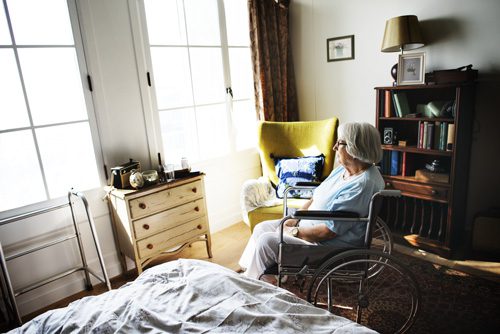
Why Seniors Are Vulnerable to Loneliness
It should be noted that social isolation isn’t necessarily the same thing as loneliness. Social isolation refers to having few opportunities for social interaction, while loneliness refers to the feeling of being alone. Because people have different levels of comfort in terms of social interaction, it’s possible for a person to be socially isolated without being lonely or to be lonely without being socially isolated.
Seniors can struggle with loneliness for a wide range of reasons.
- Retirement eliminates the social contract that took place at work
- The death of a spouse
- Adult children who live too far away to visit regularly
- Close friends who have passed away, moved to be near their own children, or have health issues that prevent socializing
- Chronic pain or health issues that limit their participation in previously enjoyed social activities
- A fixed income that makes certain forms of socializing cost-prohibitive
- Transportation issues caused by a lack of a valid driver’s license
- A lack of tech-savvy that makes online socializing difficult
Ongoing concerns about the coronavirus pandemic have also played a role in increasing the rates of loneliness among seniors. Early in the pandemic, senior centers, churches, and other places where older adults could go for socializing were closed, and seniors were encouraged to limit contact with others due to their high risk of age-related complications from COVID-19. While vaccines are now widely available, concerns about the possible effects of variants present continued challenges.
How Loneliness Can Lead to Addiction
Loneliness can have serious consequences for a senior’s physical and mental health. Loneliness often leads to a sedentary lifestyle where a senior spends most of their waking hours watching television. One study from the University of California, San Diego, found that people over 65 watch three times as much television as their younger counterparts. This lack of exercise and mental stimulation can lead to:
- Depression
- Anxiety
- Malnutrition
- Loss of muscle mass
- Decreased balance and coordination
- Worsening of age-related cognitive impairment
Loneliness also increases a senior’s risk of developing a substance use disorder. It is common for people of all ages who are experiencing mental health challenges to self-medicate their symptoms with drugs or alcohol. A lonely senior may start to gradually increase their alcohol consumption or misuse their prescription medications by taking higher or more frequent doses. They may feel as though this behavior is relatively harmless, but it can easily lead to the development of a substance use disorder if it is allowed to continue for an extended period of time.
Addiction doesn’t discriminate according to demographic factors, but gender does appear to play a significant role in a senior’s risk of substance abuse problems due to loneliness. Although senior women are more likely to live alone, they are generally more content to do so. Men tend to struggle more with the impact of loneliness, especially following the death of a spouse. In fact, according to The University of Pennsylvania Health System, widowers over the age of 75 have the highest rates of alcoholism in the United States.
Signs of a Substance Use Disorder
It is common for the signs of addiction in seniors to initially be brushed off as age-related impairment, especially if they have never struggled with substance abuse in the past. Seniors are also less likely than younger adults to voluntarily ask for help because they’ve been raised to believe that substance abuse due to mental health concerns is a cause for shame.
Some signs that indicate a senior may need treatment for a substance use disorder include:
- Mixing prescription medications with alcohol
- Being preoccupied with drinking or obtaining a steady supply of their prescription medications
- Claiming to have lost or misplaced medications to obtain more frequent refills
- Visiting multiple doctors in the hopes of obtaining additional prescriptions
- Trying to hide empty bottles of alcohol to prevent others from knowing how much they are consuming
- Lack of attention to grooming and personal hygiene
- Cuts, bruises, and other unexplained injuries
- Slurred speech and trouble following a conversation
- Mood swings
- Sleep disturbances
Getting Help
There is no need for a senior with a substance use disorder to suffer in silence. With access to care personalized to fit their unique needs, seniors can overcome addiction and get back to making the most of each day.
Located on 25 acres in beautiful Tioga County near the Pennsylvania Grand Canyon, Mountain Laurel Recovery Center provides comprehensive care designed to heal a senior’s mind, body, and spirit. Our programs help seniors develop healthy coping skills to deal with the challenges of aging and fight loneliness by promoting a connection to the border recovery community. Visit our services page to learn more about what we offer or contact our office to speak to an admissions representative.
